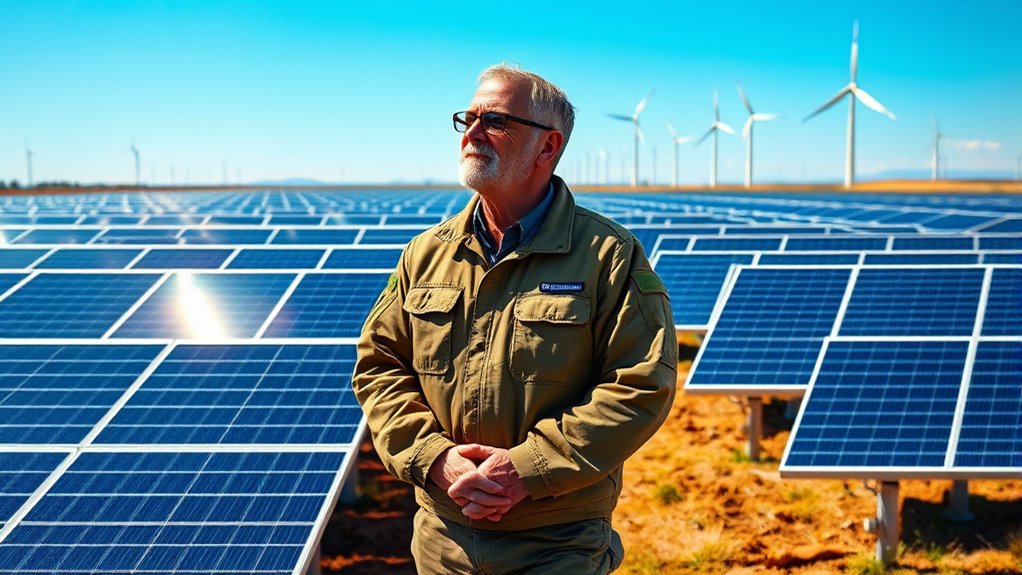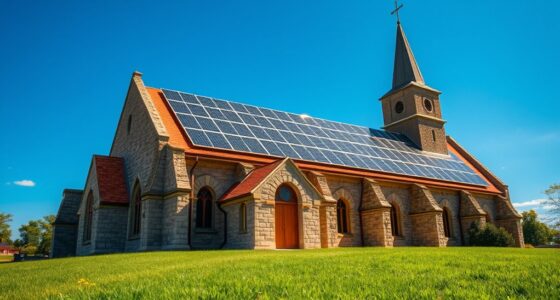Veterans are transforming their military skills into leadership roles in the booming solar industry, driving innovations and community resilience. Your discipline, technical expertise, and problem-solving abilities make you ideal for installing and maintaining solar systems. Programs like Solar Ready Vets support your transition with certifications and hands-on training. As this sector grows, veterans lead projects that promote sustainability, affordable housing, and energy independence. Discover how your skills can fuel this green revolution and create a lasting impact.
Key Takeaways
- Veterans leverage military skills like leadership and troubleshooting to excel in solar installation, management, and innovation.
- Programs like Solar Ready Vets bridge military experience with solar industry certifications and hands-on training.
- Veteran-led solar initiatives promote sustainable communities, affordable housing, and energy resilience.
- Military discipline and strategic thinking enhance project efficiency and safety in solar energy deployment.
- Veteran entrepreneurs drive technological advances, creating scalable, innovative solar solutions for environmental and social impact.
The Rising Role of Veterans in Solar Workforce Development

Veterans are increasingly becoming essential to the development of the solar workforce, bringing valuable skills and discipline that align with industry needs. Their experience in technical tasks, problem-solving, and teamwork makes them ideal for solar installation and maintenance roles. Programs like Solar Ready Vets provide targeted training, helping veterans transition smoothly into clean energy careers. Their military background fosters leadership and adaptability, which are vital as the industry expands rapidly. With the solar sector growing 27% between 2022 and 2032, veterans fill a critical gap in skilled labor. Their participation not only supports industry growth but also promotes social impact, such as affordable veteran housing projects. As the solar industry scales, veterans’ roles continue to rise, driving innovation and resilience in the renewable energy movement. Incorporating total-cost clarity and strategic planning can further enhance their industry integration, ultimately strengthening the sector’s capacity to meet energy demands. Additionally, leveraging transition programs can optimize their employment outcomes and ensure a smooth entry into the renewable energy field. Moreover, the transferable skills gained from military service are highly applicable to the evolving demands of solar technology and project management. Furthermore, their familiarity with technical tasks and adherence to safety protocols enhances overall project efficiency and safety standards.
Harnessing Military Skills for Solar Industry Success
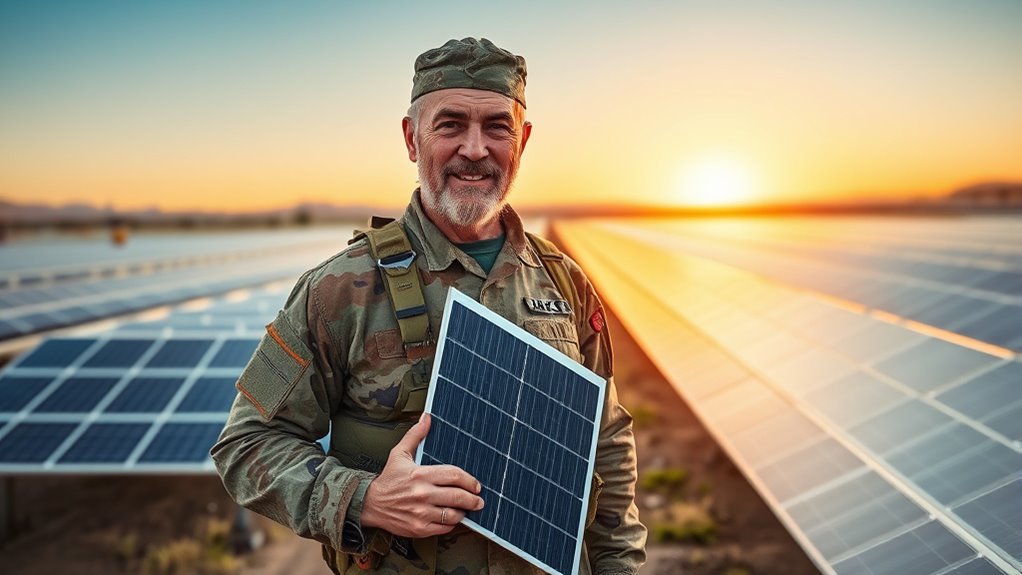
Harnessing military skills for solar industry success. Your military experience provides valuable technical skills that translate well to solar industry roles, from installation to maintenance. Leadership and discipline learned in service help veterans excel in team environments and project management. By harnessing these skills, veterans can drive innovation and efficiency in the rapidly growing solar sector. Additionally, understanding equipment operation and safety protocols from military training enhances performance on solar sites. Developing expertise in power systems further empowers veterans to troubleshoot and optimize solar energy solutions effectively, leveraging industry-specific knowledge gained through specialized training and experience. Cultivating a positive mindset can also improve resilience and adaptability in the dynamic renewable energy landscape. Moreover, familiarity with safety procedures ensures compliance and reduces risks during solar project deployment.
Technical Skills Transfer
Military training and experience provide a strong foundation of technical skills that are highly applicable in the solar industry. Your background in electronics, systems management, and problem-solving enables a seamless transition into solar installation, maintenance, and design. Many veterans already possess skills in electrical wiring, troubleshooting, and working with complex equipment—key components of solar tech. To illustrate this, consider the following:
| Military Skill | Solar Industry Application | Example |
|---|---|---|
| Electrical Systems | Solar panel wiring | Installing and troubleshooting PV systems |
| Problem Solving | Diagnostics and repair | Diagnosing inverter or panel issues |
| Leadership & Teamwork | Project coordination | Leading installation crews |
| Technical Aptitude | System design & analysis | Optimizing energy output |
Your military-acquired skills are essential assets driving success in the solar sector.
Leadership and Discipline
How can the discipline and leadership skills cultivated in the military seamlessly translate into success in the solar industry? Your military experience develops a strong sense of responsibility, strategic thinking, and team coordination—traits essential for solar projects. Leadership skills enable you to manage teams efficiently, navigate complex installations, and ensure safety standards are met. Discipline helps maintain focus during demanding tasks and adheres to tight schedules, reducing errors and increasing productivity. The military’s emphasis on accountability and problem-solving translates directly into managing solar operations and troubleshooting technical issues. Your ability to adapt quickly and lead under pressure makes you a valuable asset in this fast-growing industry. By harnessing these skills, you can drive innovation, foster teamwork, and help accelerate the transition to clean energy. Military discipline enhances your capacity to stay organized and meet project deadlines under challenging circumstances. Additionally, applying energy sector knowledge can further strengthen your impact in advancing sustainable solutions. Recognizing the importance of home organization can help you create efficient and safe work environments on-site, contributing to overall project success. Developing Cultural Intelligence can also facilitate better collaboration with diverse teams and stakeholders in the global renewable energy market. Moreover, understanding ethical hacking principles can assist in safeguarding solar infrastructure from cyber threats, ensuring the security and reliability of energy systems.
Key Programs Supporting Veteran Transition Into Solar Careers
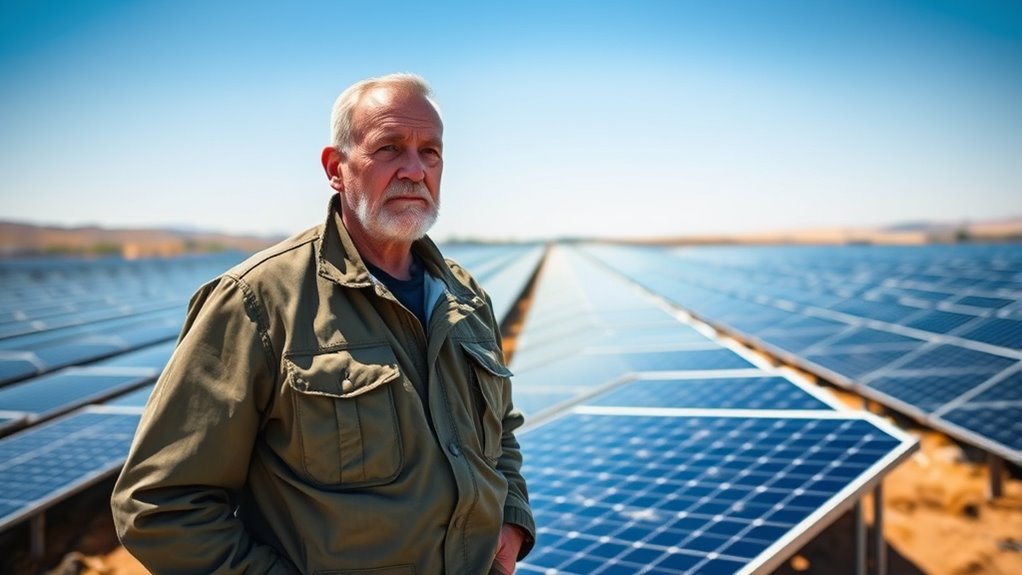
Have you ever wondered how veterans smoothly shift into the solar industry? It’s thanks to key programs designed specifically for their transition. These initiatives provide targeted training, mentorship, and job placement support, making solar careers accessible and achievable. Here’s what they typically include:
- Solar Ready Vets Network offering hands-on training and industry certifications
- Partnerships between the military, government, and private solar companies
- Apprenticeship programs focused on solar installation and maintenance skills
- Workshops and career fairs connecting veterans with solar employers
- Financial assistance and incentives to support certification costs
- Proper vase selection can impact flower longevity and presentation.
These programs leverage veterans’ discipline and technical skills, helping them enter a booming industry with confidence. They’re transforming military experience into valuable assets for the renewable energy sector.
The Economic Impact of Solar Expansion on Veteran Communities
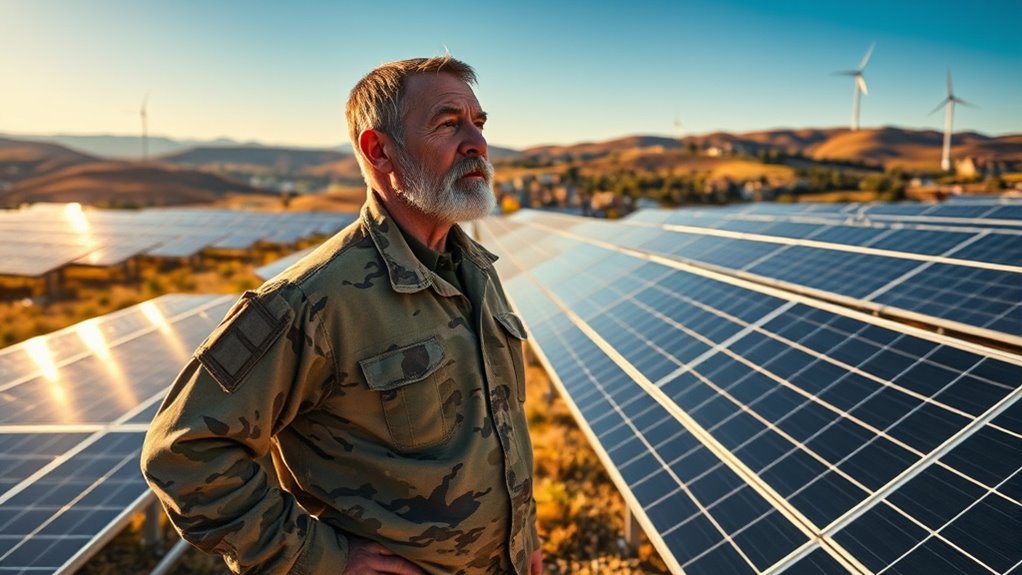
The growth of solar programs tailored for veterans isn’t just creating new jobs—it’s also transforming local economies and boosting veteran communities. You’ll see increased employment opportunities as veteran-focused solar companies expand, providing stable, well-paying careers. These jobs help veterans achieve financial independence and reduce reliance on assistance programs. Additionally, community-based projects like veteran housing with integrated solar reduce utility costs, easing financial burdens for many veterans. Local businesses benefit from increased demand for solar installation and maintenance services, fueling economic growth. By investing in veteran-led solar initiatives, you’re strengthening community resilience and fostering economic stability. This expansion not only empowers veterans but also stimulates local economies, creating a ripple effect of growth and opportunity for the communities they serve. Furthermore, the integration of solar energy into community infrastructure supports sustainable development and long-term environmental benefits for veteran neighborhoods. The deployment of solar technology also encourages innovation and skill development within veteran populations, promoting long-term employment opportunities. Recognizing the importance of reliable power systems, these initiatives contribute to increased energy independence and resilience for veteran communities facing power outages or energy insecurity. Moreover, these programs often include training and education, equipping veterans with valuable skills for a growing industry, which further enhances their long-term career prospects. Incorporating community engagement strategies ensures that these projects meet local needs and foster a sense of ownership among veterans and residents alike.
Innovative Veteran-Led Solar Projects and Social Impact
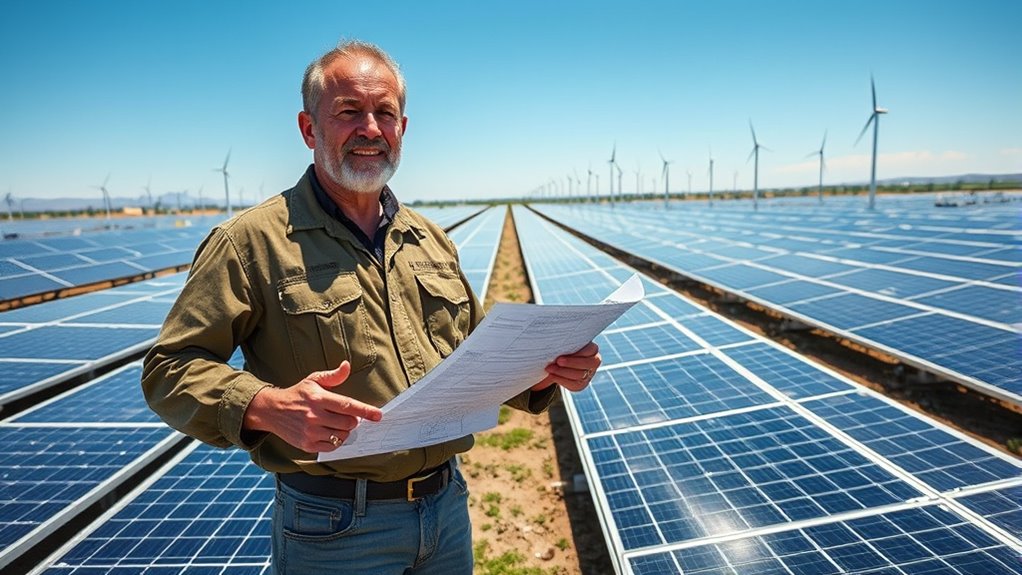
You can see how veteran-led solar projects are making a real difference by combining sustainability with community support. These initiatives often focus on social impact, like providing affordable housing with integrated solar power, benefiting veterans and their neighborhoods. By using innovative technologies, they maximize energy efficiency while creating lasting positive change. Additionally, incorporating positive energy principles can help attract more resources and support for these impactful projects. Ensuring the authenticity and quality of materials used in these projects is crucial, as highlighted by the importance of verifying product legitimacy to maintain trust and effectiveness.
Veteran-Driven Sustainability Initiatives
Veteran-led solar projects are making a significant impact by blending sustainability with social purpose. These initiatives focus on improving communities while promoting clean energy. You can see veteran-led efforts:
- Developing affordable housing with integrated solar systems, like Easterseals NH’s campus
- Using advanced solar tech to maximize energy efficiency and reduce costs
- Creating community-centered projects that support veterans and active military personnel
- Incorporating solar design into new veteran housing developments for long-term sustainability
- Promoting social impact by providing income-eligible housing and utilities savings
- These initiatives also emphasize holistic approaches that address mental, physical, and emotional well-being, ensuring comprehensive support for community members. Moreover, integrating renewable energy solutions into community projects enhances resilience against climate change and energy costs.
These projects exemplify how veterans leverage their skills for social good, fostering resilience and community empowerment. Their leadership not only advances renewable energy but also addresses social needs, creating sustainable, supportive environments for those who served.
Social Impact in Housing
Innovative veteran-led solar projects are redefining how social impact and sustainable housing intersect. You see, these initiatives go beyond just installing solar panels—they focus on improving veterans’ lives through affordable, energy-efficient housing. For example, Easterseals NH’s campus combines income-eligible housing with a 46.11 kW solar array, markedly reducing utility costs and easing financial burdens. Veterans lead these projects, ensuring community needs shape development. They incorporate advanced solar technologies, maximizing energy production and sustainability. These efforts promote social equity by making housing more affordable and resilient for veterans and their families. By integrating solar power into housing projects, veteran-led initiatives foster community resilience, cut costs, and create models for sustainable living that benefit both individuals and society at large.
Innovative Solar Technologies
Advanced solar technologies are transforming veteran-led projects by maximizing energy efficiency and sustainability. You see innovations like high-efficiency panels, smart inverters, and energy storage systems that boost output and reliability. These advancements allow projects to generate more power with less space and reduce costs markedly. Veteran-led initiatives often incorporate cutting-edge solutions such as:
- Rooftop solar arrays with advanced monocrystalline panels
- Battery storage to ensure power during outages
- Smart grid integration for real-time energy management
- Modular, scalable systems for future expansion
- Solar tracking technology to follow the sun’s path and increase yield
These innovations not only amplify environmental benefits but also create social impact by making clean energy more accessible and affordable for veterans and communities alike.
Challenges and Opportunities in Training Veteran Solar Technicians

Training veteran solar technicians presents both significant challenges and promising opportunities. Many veterans face gaps in technical skills specific to solar technology, requiring specialized training programs tailored to their backgrounds. transitioning military discipline and leadership skills into the civilian solar industry can be smooth but demands adaptable curricula that match industry standards. Funding and access to comprehensive training remain hurdles, especially for underserved veterans. However, these challenges open avenues for innovative educational models, partnerships, and mentorship initiatives. Veterans’ strong work ethic, problem-solving abilities, and teamwork make them ideal candidates for solar careers. By addressing training gaps and leveraging their skills, you can help veterans succeed in solar roles, accelerating industry growth while providing meaningful employment and social impact.
Technological Advances Powering Veteran-Driven Solar Initiatives
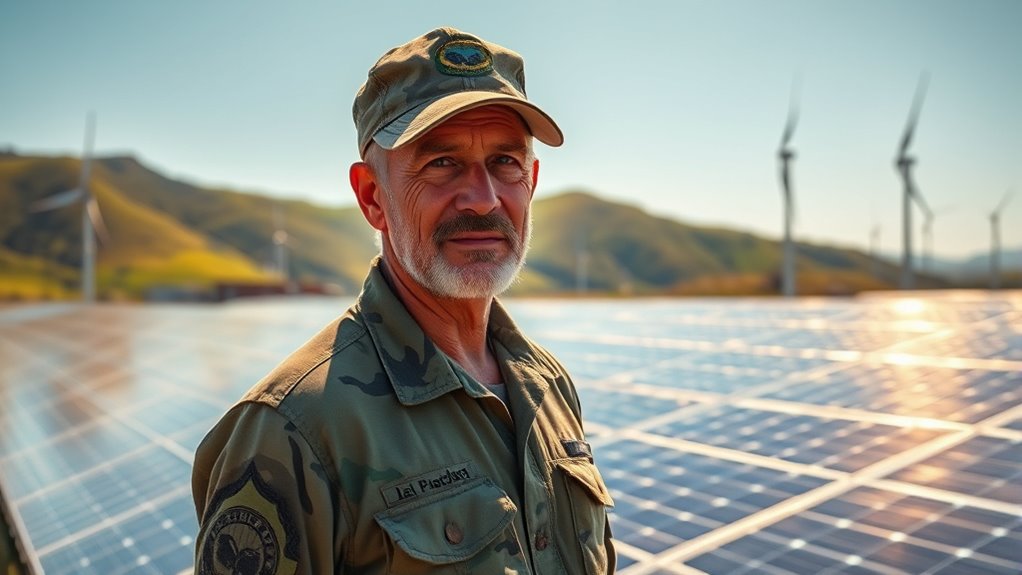
Technological advances are increasingly empowering veteran-driven solar initiatives by enabling more efficient and cost-effective energy solutions. You can see this in the adoption of innovative tools and systems that streamline installation, maintenance, and monitoring. Advanced solar panels, like high-efficiency photovoltaic cells, maximize energy output with less space. Smart inverters optimize energy flow, improving grid compatibility and resilience. Drones assist in site surveys, reducing labor time and increasing safety. Data analytics enable precise performance tracking, helping veterans identify issues quickly. Additionally, modular and scalable systems make expanding projects easier and more affordable. These breakthroughs foster quicker deployment, lower costs, and more reliable energy, allowing veterans to lead impactful projects that serve communities while advancing clean energy goals.
The Growing Demand for Solar Installers and Veteran Participation
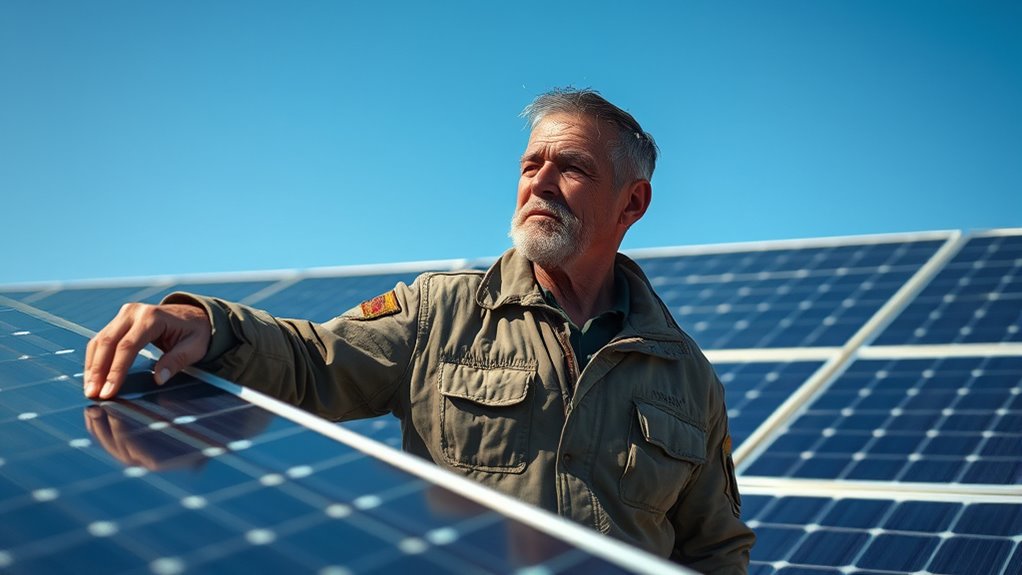
As the demand for solar installations continues to surge, the need for skilled installers grows rapidly across the United States. You’ll find that veterans are increasingly stepping into this expanding sector because of their discipline, technical skills, and leadership qualities. Solar companies actively recruit veterans for both entry-level and senior roles, recognizing their ability to adapt quickly and work efficiently in dynamic environments. Programs like Solar Ready Vets provide essential training, making the transition smoother for veterans entering the industry. With the solar workforce expected to grow by 40% by 2025, veterans are well-positioned to fill these roles. Their participation not only helps meet rising installation demands but also fuels community-focused projects, combining economic growth with social impact.
Future Trends: Solar Growth and Veteran Leadership
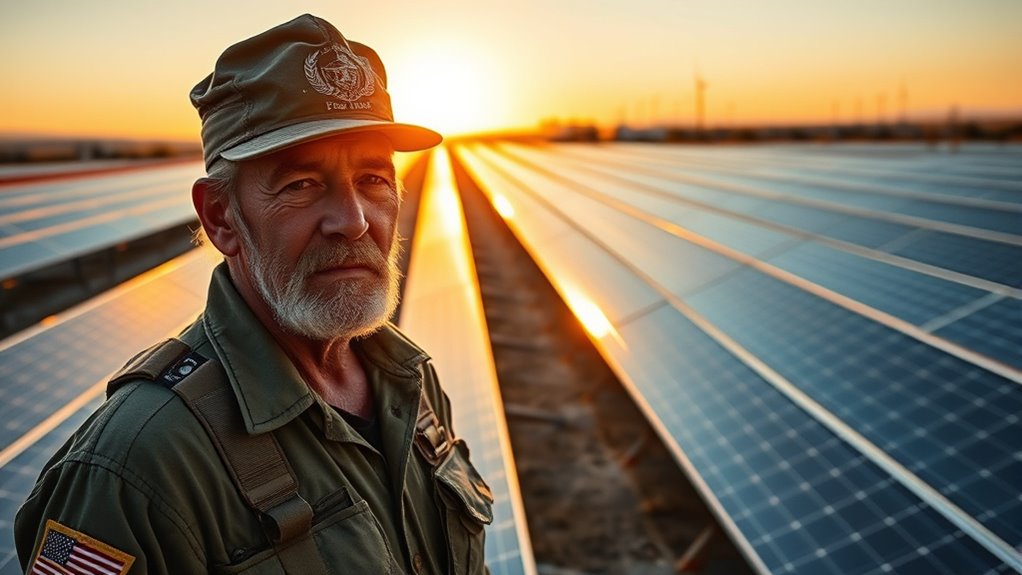
As the solar industry accelerates its growth, veteran leadership is poised to play a key role in driving innovation and expansion. Your experience and skills make you essential to meeting the rising demand for clean energy solutions. Together, veterans are shaping the future of solar, ensuring it continues to grow sustainably and inclusively.
Accelerating Industry Expansion
The solar industry is set to accelerate its expansion considerably in the coming years, driven by strong market demand and supportive policies like the Inflation Reduction Act. You’ll see rapid growth in capacity, jobs, and innovation, with more veterans stepping into key roles. This surge will create new opportunities and reshape the energy landscape. As industry demand increases, so does the need for skilled installers and technicians.
- Capacity is projected to more than double to 438 GW by 2029
- Solar jobs are expected to grow by 27% between 2022 and 2032
- Workforce demands will require a 50% increase in skilled labor by 2030
- Veteran participation will continue rising through targeted training programs
- Private investments surpass $60 billion annually, fueling expansion
Veteran-led Innovation Surge
Veteran-led innovation is poised to drive the solar industry’s next wave of growth, blending military-honed skills with cutting-edge renewable energy technologies. Veterans bring discipline, leadership, and technical expertise, making them ideal for pioneering new solar solutions. They are spearheading projects that combine social impact with environmental sustainability, such as affordable veteran housing powered by solar. Programs like Solar Ready Vets equip veterans with specialized training, enabling rapid integration into the industry. Veteran entrepreneurs are developing innovative solar products, from portable systems to smart energy management tools. As industry demand surges, veteran-led startups and collaborations will accelerate technological advancements, expand market reach, and foster community resilience. Their leadership not only fuels growth but also guarantee the sector’s sustainable and inclusive future.
Building Resilient Communities Through Veteran-Led Solar Solutions

Building resilient communities increasingly depends on innovative solutions that combine social impact with sustainable energy. Veteran-led solar initiatives exemplify this approach, creating lasting benefits. These projects often focus on affordable housing, energy independence, and community empowerment. Imagine:
Building resilient communities through veteran-led solar solutions for affordable housing and energy independence.
- Solar-powered housing that reduces utility costs for veterans and families
- Community centers with solar arrays providing free or low-cost energy
- Training programs led by veterans to teach solar skills locally
- Partnerships between nonprofits and solar companies to expand access
- Emergency preparedness plans incorporating solar backup systems
Frequently Asked Questions
How Do Military Leadership Skills Translate to Solar Project Management?
Your military leadership skills easily translate to solar project management. You bring discipline, strategic thinking, and problem-solving abilities that keep projects on track. Your experience in team coordination and clear communication guarantees everyone understands their roles. Plus, your adaptability helps you handle unforeseen challenges quickly. These qualities make you an effective leader, capable of guiding solar projects from planning through execution, ensuring success and fostering innovation in the clean energy sector.
What Incentives Are Available Specifically for Veterans Pursuing Solar Careers?
You can access several incentives when pursuing a solar career as a veteran. Programs like the Solar Ready Vets offer tailored training and job placement assistance. Additionally, the federal Investment Tax Credit (ITC) and state-specific incentives can reduce installation costs for solar projects. Many companies also provide veteran-specific benefits, scholarships, and apprenticeships to support your progression into clean energy, helping you leverage your skills and gain valuable experience.
How Do Veteran-Led Solar Projects Improve Community Resilience?
Veteran-led solar projects boost community resilience by providing reliable, affordable energy, especially during outages or emergencies. You help create sustainable housing and public spaces that reduce dependence on grid power. These projects often incorporate social goals, like affordable housing for veterans, fostering local economic growth. Your leadership encourages community engagement, strengthens local infrastructure, and promotes environmental sustainability, making neighborhoods more adaptable and resilient to future challenges.
What Are the Main Barriers Veterans Face Entering the Solar Industry?
You face hurdles like training gaps, where the sky isn’t yet clear enough to see your path forward. Licensing and certification requirements can feel like tangled wires blocking your progress. Limited awareness about solar careers can leave you in the dark. Access to affordable education and mentorship is scarce, making it harder to navigate this new terrain. Overcoming these barriers requires targeted support and clear guidance to help you shine in the solar industry.
How Can Private Companies Better Support Veteran Participation in Solar?
You can better support veteran participation in solar by offering targeted training programs like Solar Ready Vets, providing mentorship, and creating clear career pathways. Additionally, companies should promote inclusive hiring practices, partner with veteran organizations, and offer flexible work arrangements to accommodate veterans’ unique needs. Recognizing military skills and emphasizing social impact projects will also attract more veterans, helping them shift smoothly and thrive in the solar industry.
Conclusion
As you witness veterans leading the solar revolution, it’s clear they’re transforming communities and shaping a sustainable future brighter than the sun itself. Your support and recognition amplify their impact, fueling a movement that could outshine even the most powerful storms. By embracing their skills and stories, you’re not just backing a industry — you’re igniting a global shift that promises to redefine resilience, innovation, and hope for generations to come.
